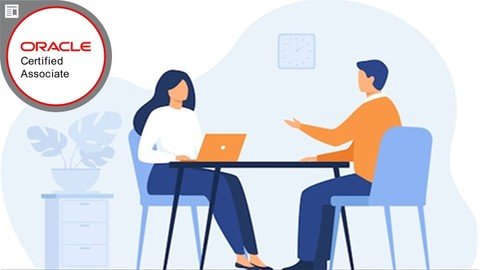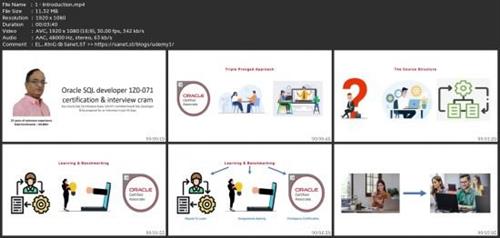Oracle Sql Developer 1Z0-071 Certification & Interview Cram
Published 4/2024
MP4 | Video: h264, 1920x1080 | Audio: AAC, 44.1 KHz
Language: English | Size: 5.04 GB | Duration: 17h 12m
Ace Oracle SQL Certification Exam 1Z0-071 - Be certified Oracle SQL Developer in 45 days - SQL interview preparation
What you'll learn
Launch yourself as Certified Oracle SQL Developer in just 45 - 60 days
Ace Oracle Certified Associate (OCA) Exam 1Z0-071 in first attempt
Work easily with any SQL databases, of course apart from Oracle - MySQL, PostgreSQL, SQLServer, DB2 & many more
Develop ability to write most efficient SQL code to retrieve, filter, and present information
Apply SQL to most complex data handling problems faced in real work situations
Gather the skills that are necessary to be an in-demand SQL Developer
Sets of FAQ with their model answers to crack any SQL interview out there
Requirements
Just an intense urge to learn SQL and confidence to be successful
A working PC or laptop with Windows-7 or above
No exposure to or experience is required to take this course
Description
Is your goal a promising evergreen IT career? And you're looking for an immediate start? What else can be better than becoming an Oracle Certified SQL developer? Two things - Firstly, Oracle Certification is the most prestigious of all the IT certifications in the job market and secondly, there is no other language than SQL, quickly to master with this unique course (in just 45-60 days), apart from SQL is having the highest employment potential with dream salaries in the range of $80,000 per year, even as a beginner. Moreover, SQL skills are mandatory for everyone aspiring for a job related to querying/analyzing data, programmers, developers, management personnel and analysts.Have you been in search of an SQL course which can assure you of profound success?Your search should stop here. You could have arrived here through long search by chance, but now you are just one step away from your dream career and that's of completing this course. Bear in mind that this course is not merely a pack of videos of demonstration on SQL with some narration or commentary, unlike most others, but it has been strategically structured to delve into depth of every single concept to make you a genius in SQL programming and hence achieve the most coveted Oracle Certified Associate (OCA) certification 1Z0-071 in your very first attempt.Is this course for me?Absolutely! And that too irrespective of your level. You may not be having any exposure to databases or having a little prior experience with programming in other languages or even having some little SQL background, this course is for you. This course is a complete cookbook on Oracle SQL - right from initial baby steps in SQL to the level of using this content as reference to solve most intricate real-time problems, for those in working. A course truly from absolute scratch to expertise level. The only requirement is your intense desire to be an Oracle Certified SQL Developer. No prior knowledge is envisaged.Why only this course?Hardly you may find such a comprehensive technical coverage on Oracle SQL Certification Exam 1Z0-071 anywhere elseThis course is entirely practical oriented, every concept is demonstrated through real time industry level exampleTriple purpose - Quick Certification cram, interview preparation and as ready reference while on job100% industry oriented contentUpon completing this course, apart from OCA, you will be able to interact and query any SQL database out thereDesigned and delivered by a professionally experienced corporate trainerHow can I be assured of this course is the best?You can go through the curriculum of this course right now and compare it with any of the other courses on this same topic. There are plenty of sample lessons which you can access before you buy, and even after you buy it, you have full one month to make a judgement. You are assured of 100% refund if even remotely you find it unsuitable; no questions asked.Remember : SQL is a "mandatory" skill for you as a job aspirant in IT industry, for the today's world is data oriented. Let's do it!
Overview
Section 1: Introduction
Lecture 1 Introduction
Section 2: Introduction to Database Terminologies
Lecture 2 What is Data?
Lecture 3 What is RDBMS?
Lecture 4 What is Normalization?
Lecture 5 What is Dependency?
Section 3: Oracle Installation and Sample Data
Lecture 6 Installation of Oracle Express Edition
Lecture 7 Connecting to an Oracle database
Lecture 8 Installation of Sample Schema
Lecture 9 Installing Oracle SQL Developer GUI Client
Section 4: Query Basics
Lecture 10 What is DQL?
Lecture 11 DQL Parts of Speech (Explanation on syntax of basic SELECT statement )
Lecture 12 What is Rule of Precedence for AND & OR combination of operators?
Section 5: Enhanced Logical Operators
Lecture 13 When do you use IN operator?
Lecture 14 When Do You Use BETWEEN Operator?
Lecture 15 When Do You Use LIKE Operator?
Lecture 16 How Do You Find Data Containing % Character By Using LIKE Operator?
Lecture 17 When Do You Use Negative Condition?
Section 6: Understanding and Handling NULL
Lecture 18 When Do You Need To Use NVL Function?
Lecture 19 How is NVL2 Different From NVL Function?
Lecture 20 How COALESCE Function Helps Deal With NULL?
Section 7: DUAL Table, Pseudo Columns and Sorting
Lecture 21 What are Important Properties of DISTINCT Operator?
Lecture 22 What are Important Properties of ORDER BY Clause?
Lecture 23 How to LIMIT Result to N Rows In Oracle?
Lecture 24 What is ROWID?
Lecture 25 What is ROWNUM?
Lecture 26 What DUAL Table Is Made Of?
Section 8: Set Operators
Lecture 27 What are Set Operators In SQL?
Lecture 28 Use of UNION Set Operator Explained
Lecture 29 Use of INTERSECT Set Operator Explained
Lecture 30 Use of MINUS Set Operator Explained
Lecture 31 What Are Union Compatibility Rules?
Lecture 32 How to Solve a Conditional Case?
Lecture 33 How to Emulate OFFSET Clause With Set Operation?
Section 9: Nested & Correlated Queries
Lecture 34 What is a Nested Query?
Lecture 35 How to Solve Multivalued Subquery?
Lecture 36 How to Use Multivalued Subquery Operator ANY?
Lecture 37 How to Use Multivalued Subquery Operator ALL?
Lecture 38 What Is Difference Between SOME and ANY Operators?
Lecture 39 What Are Multiple Columns Subqueries?
Lecture 40 How Is Correlated Subquery Different Than Subquery?
Lecture 41 How Is EXISTS Operator Different Than IN?
Lecture 42 What If Subquery May Return NULL?
Section 10: INNER and OUTER Joins
Lecture 43 What Is INNER JOIN and Its Drawbacks?
Lecture 44 What Is Non-Equi Join?
Lecture 45 What Is Self Join?
Lecture 46 What Are Drawbacks of Outer Join Operator?
Lecture 47 What Are Advantages of OUTER JOIN Clause?
Lecture 48 Can We Substitute Join For Subquery?
Section 11: General SQL Functions / Row Functions
Lecture 49 What Are Single Row Built-in Functions?
Lecture 50 What Categories of Single Row Functions Are We Studying? (must read)
Lecture 51 What TO_CHAR Function Is Used For?
Lecture 52 What TO_NUMBER Function Is Used For?
Lecture 53 What TO_DATE Function Is Used For?
Lecture 54 How To Evaluate Odd Root Of A Number?
Lecture 55 How To Find Max In Multiple Arguments?
Lecture 56 How To Determine If X And Y Are Equal?
Lecture 57 How To Check If Given Number Is Prime?
Lecture 58 What Is Use Of CEIL And FLOOR Functions?
Lecture 59 How Is ROUND Function Different From CEIL?
Lecture 60 What Is Difference Between TRUNC And FLOOR?
Lecture 61 What Is The Use Of Case Conversion Functions?
Lecture 62 Demonstrate Application Of REVERSE Function?
Lecture 63 How To Cut A String Short By Given Length?
Lecture 64 How Is INSTR Different Than SUBSTR?
Lecture 65 What If Final Length Given Is Smaller Than Data In LPAD/RPAD?
Lecture 66 How To Write Hierarchical Query Statement?
Lecture 67 What Is Difference Between TRIM, LTRIM and RTRIM Functions?
Lecture 68 How To Trim String Off Unknown Trimming Characters?
Lecture 69 VSIZE or LENGTH What Is The Difference?
Lecture 70 How To Show Multiline Text In One Line or In Continuation?
Lecture 71 How To Detect Strings Containing Illegal or Undesirable Characters?
Lecture 72 Illegal or Undesirable Characters Problem Solution By Using LTRIM / RTRIM
Lecture 73 REPLACE vs TRANSLATE - What Is The Difference?
Lecture 74 How To Calculate Date On Last Saturday Of Any Month?
Lecture 75 How to Calculate Retirement Date of an Employee From His Date of Birth?
Lecture 76 How Would You Calculate Service Span Of Employees?
Section 12: GROUP BY and HAVING
Lecture 77 What Are Aggregate Functions And Their Properties? (Must watch this)
Lecture 78 When Does GROUP BY Clause Become Mandatory?
Lecture 79 How Do You Find Maximum of Averages?
Lecture 80 How To List Department Wise Highest Paid Employees With Their Salaries?
Lecture 81 What Is Subgrouping in Aggregation?
Lecture 82 What Is GROUP BY ROLLUP Clause Used For?
Lecture 83 What Is GROUP BY CUBE Clause Used For?
Lecture 84 What Is GROUP BY GROUPING SETS Used For?
Section 13: Conditional & Analytical Functions
Lecture 85 How To Perform IF-THEN-ELSE Like Operation In Oracle SQL?
Lecture 86 How To Use DECODE In Cases Of Inequality Comparison like "Less" or "Greater"?
Lecture 87 How Does DECODE Respond When Expression Has To Be Compared With a NULL Value?
Section 14: Transaction Control & DML
Lecture 88 What Is a Database Transaction, its properties and TCL?
Lecture 89 How To INSERT Single or Multiple Rows In Table or Copy Rows From One to Another?
Lecture 90 What Are Different Modes of UPDATE Statement? How to Use DECODE & IN-LINE View?
Lecture 91 What Are Different Modes of DELETE Statement? Including Correlated Subquery
Lecture 92 What Is SELECT FOR UPDATE Clause Used For?
Absolute fresher looking to explore first career in the field of Information Technology,Absolute beginners dreaming to work in the fields of Data Science and Data Analysis,Working professionals, programmers and developers in other programming languages,Aspirants of managerial jobs and MBA fresher,Job aspirants in the field of marketing, strategy planning, sales, field surveys and psephology/statistical projection,Anyone who needs to strengthen skills in writing efficient SQL
Screenshots
rapidgator.net:
nitroflare.com:Kod:https://rapidgator.net/file/f7899da4b823f117878ca684863f9a79/qcyyu.Oracle.Sql.Developer.1Z0071.Certification..Interview.Cram.part1.rar.html https://rapidgator.net/file/d01ec5034bbdf16de522cc8545000ec7/qcyyu.Oracle.Sql.Developer.1Z0071.Certification..Interview.Cram.part2.rar.html https://rapidgator.net/file/e3d473434e552f32a2ab0a9443b96890/qcyyu.Oracle.Sql.Developer.1Z0071.Certification..Interview.Cram.part3.rar.html https://rapidgator.net/file/55a9c17bb806f05e14426d262f64a61c/qcyyu.Oracle.Sql.Developer.1Z0071.Certification..Interview.Cram.part4.rar.html https://rapidgator.net/file/e1ef256616ef3ecaf961a8c534fb6916/qcyyu.Oracle.Sql.Developer.1Z0071.Certification..Interview.Cram.part5.rar.html https://rapidgator.net/file/a873022a5189bd4c8fb46453e8c8eec8/qcyyu.Oracle.Sql.Developer.1Z0071.Certification..Interview.Cram.part6.rar.html
Kod:https://nitroflare.com/view/1C770C76839908B/qcyyu.Oracle.Sql.Developer.1Z0071.Certification..Interview.Cram.part1.rar https://nitroflare.com/view/0FB707443B654F9/qcyyu.Oracle.Sql.Developer.1Z0071.Certification..Interview.Cram.part2.rar https://nitroflare.com/view/1B57BBBFAF0168F/qcyyu.Oracle.Sql.Developer.1Z0071.Certification..Interview.Cram.part3.rar https://nitroflare.com/view/3B6CB937D0D1407/qcyyu.Oracle.Sql.Developer.1Z0071.Certification..Interview.Cram.part4.rar https://nitroflare.com/view/BBDDF69DF73583E/qcyyu.Oracle.Sql.Developer.1Z0071.Certification..Interview.Cram.part5.rar https://nitroflare.com/view/2558EDA276349D7/qcyyu.Oracle.Sql.Developer.1Z0071.Certification..Interview.Cram.part6.rar
1 sonuçtan 1 ile 1 arası
-
05.04.2024 #1Üye



- Üyelik tarihi
- 20.08.2016
- Mesajlar
- 144.947
- Konular
- 0
- Bölümü
- Bilgisayar
- Cinsiyet
- Kadın
- Tecrübe Puanı
- 153
Oracle Sql Developer 1Z0-071 Certification & Interview Cram
Konu Bilgileri
Users Browsing this Thread
Şu an 1 kullanıcı var. (0 üye ve 1 konuk)



 LinkBack URL
LinkBack URL About LinkBacks
About LinkBacks






 Alıntı
Alıntı
Konuyu Favori Sayfanıza Ekleyin